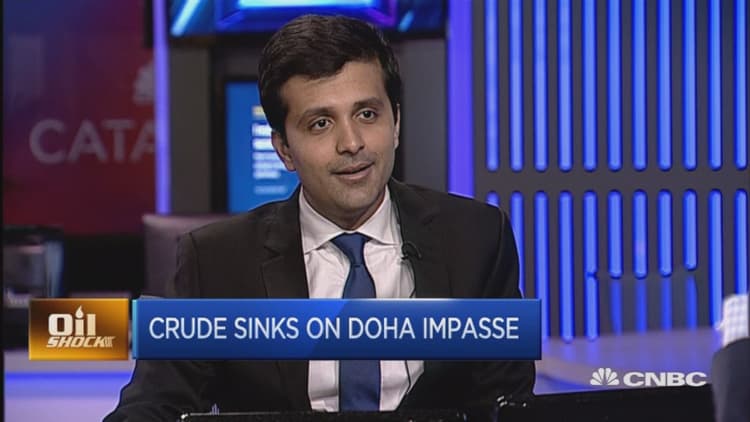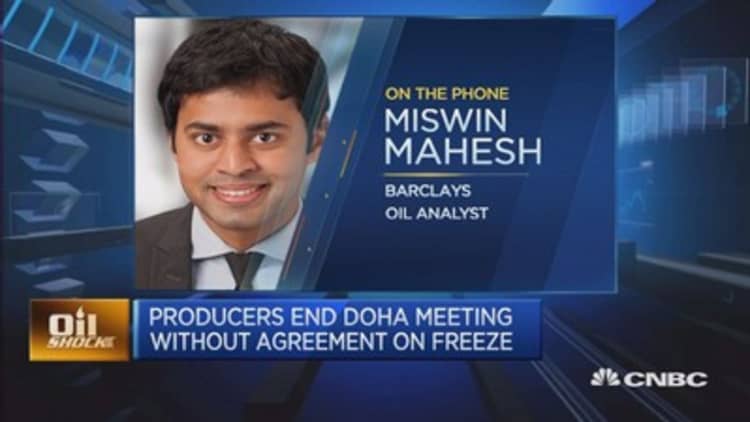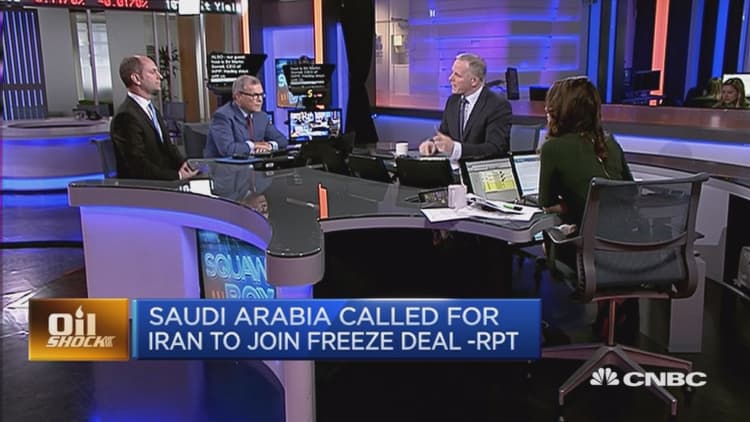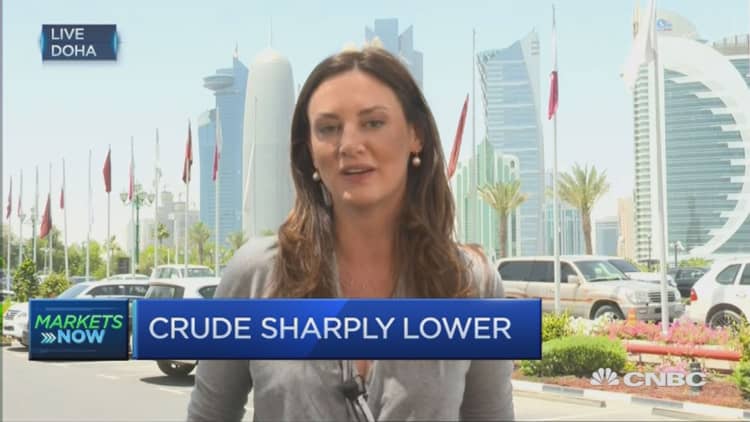






Global oil prices and stock markets tumbled on Monday after major oil producers failed to agree on a deal to freeze output, but analysts are insisting that no deal is actually the best possible outcome for markets.
Equity and oil markets have been hit after talks among 16 global OPEC and non-OPEC producers in Qatar on Sunday failed to produce any deal to freeze production. There were hopes that a freeze would support oil prices, which have fallen dramatically since mid-2014 due a glut in supply and lagging demand.
'Rational decision'
Despite the collapse of talks, oil market watchers said the lack of a "Doha deal" would be better in the long term and would mean that a rebalancing process of supply and demand can continue to its natural conclusion.
"We can see it as the rational decision that there has been no decision (in Doha)," Michele Della Vigna, co-head of European Equity Research at Goldman Sachs, told CNBC on Monday.
"It has taken 18 months to start to rebalance the oil market with falling non-OPEC production in a variety of countries and demand showing signs of recovery which means we are getting there, we're getting to a new equilibrium."
"So why delay it with a self-defeating rally that would bring an oil price to above $40 a barrel too quickly and one that would incentivize producers to ramp back up production?" he asked.
Talks at the weekend fell apart after Saudi Arabia, the de facto leader of 13-member oil producer group OPEC, said it would not freeze output levels if fellow member Iran did not participate in the freeze. But Iran, which didn't even attend the talks, had always said it was unwilling to freeze production levels as it seeks to regain its share of the market which was lost during years of economic sanctions.
While struggling OPEC and non-OPEC oil producers might not be so sanguine about a failure of talks admittedly not many producers or oil analysts were optimistic from the start. For one, Russia's finance minister told CNBC last week that his country, which is a major oil exporter and present at the talks, did not expect any price change after Doha.
Pressure and lower prices 'better'
Although market watchers had warned that political rivalry between the two Middle Eastern powerhouses would scupper any chance of a compromise and deal, stock and oil markets took the failure badly with Asian and European markets trading lower on Monday morning. Oil prices fell over 5 percent in early Asian trade and were still trading around $41.21 a barrel for benchmark Brent crude and $38.47 for U.S. WTI (West Texas Intermediate) in early European trade.
The slump in oil prices is continuing to pressure shale oil producers in the U.S. where production, exploration and rig counts have fallen back dramatically over the last 18 months. While price pressures continue to punish non-OPEC producers like the U.S., that drop in supply was helping markets as a whole.
Goldman's Della Vigna said this continuing pressure on producers to cut supply was ultimately good for markets. "I think no deal is probably better for the longer-term because it continues this process of rebalancing and there is no rebalancing without pressure and pressure comes through lower oil prices, through tighter credit and we're seeing all of that playing out nicely," he said.
Goldman said on Monday that it was maintaining its fourth-quarter 2016 forecast of $45 a barrel for WTI crude and said that its full-year 2017 average WTi forecast was $58 a barrel, Reuters reported. In the short-term it said its forecast for $35 a barrel for WTI in the second quarter was now "more likely" following the decision not to freeze production.
Della Vigna said that there would be another six to nine months before the market "will again be in a deficit market with drawing inventories."
Miswin Mahesh, oil analyst at Barclays, agreed that a gradual recovery for oil markets was "still in place as non-OPEC supply reduces" and predicted that prices would not fall below $30 a barrel due to the lack of a deal.
Even if a freeze had been agreed, oil prices would not have changed that much anyway "because it's not like producers are taking away barrels," he added.
"It's a tepid recovery but it's still headed higher because the non-OPEC supply adjustments are coming through. Demand is still looking a lot softer than last year but it is a balanced market. If prices were trading above $40 a barrel, we would have had a much harder time balancing the market. The fat that we're going lower could help balances a lot better in the second half of the year," he said.




